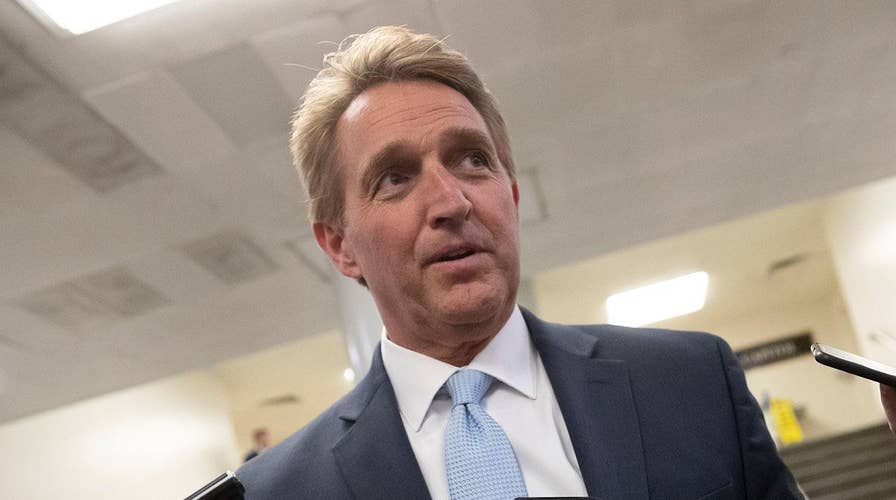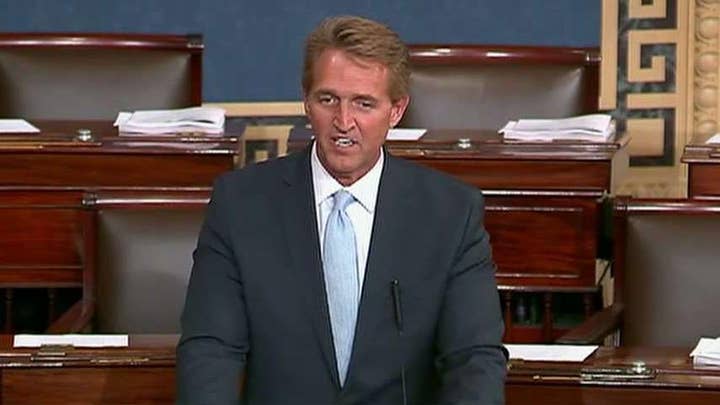Flake trying to force GOP leaders to vote to protect Mueller
Sen. Jeff Flake threatens to block confirmation of conservative judges in order to force a vote; reaction from Sen. Ben Sasse.
It’s not uncommon to discuss law in this space. After all, we report on Congress.
However, it’s rare that we discuss laws of physics here. In particular Newton’s Third Law of Motion: For every action, there is an equal and opposite reaction. Newton’s law details how force, introduced by friction, tension, gravity and magnetic fields trigger a polar and uniform reaction.
This week, the laws of physics can be fused with the laws of politics.
Here is the “Third Law of Congress”: For every action on Capitol Hill, there is an equal and opposite reaction – and consequences.
The Third Law of Congress dominated the United States Senate this week. The Third Law linked the investigation led by Special Counsel Robert Mueller to the failed nomination of Thomas Farr to the federal bench.
Sen. Jeff Flake, R-Ariz., has tried for weeks to get the Senate to consider and approve legislation to protect Mueller from getting canned. The Senate requires the blessing of all 100 senators to start debate on a bill, called “unanimous consent.” But takes just a singular objection by any senator to keep the debate at bay.
On Nov. 14, Flake went to the Senate floor and asked unanimous consent that the Senate call up the Mueller protection bill and simultaneously pass it. But Senate Majority Leader Mitch McConnell, R-Ky., objected, blocking Flake. Flake attempted the same gambit this past week. This time Sen. Mike Lee, R-Utah, jammed Flake with an objection of his own.
“This is a solution in search of a problem. The president’s not going to fire Robert Mueller nor do I think he should,” argued McConnell. “We have a lot of things to finish up this year without taking votes on things that are completely irrelevant to outcomes.”
Back to congressional physics.
There was an action by Flake, met by an equal and opposite reaction by McConnell and Lee. And then, as is the case on Capitol Hill, there were consequences.
Flake warned colleagues that he wouldn’t help President Trump advance any of his judicial nominees unless he got a vote on his bill. That’s where the Mueller protection legislation found a nexus with the nomination of Thomas Farr to become a federal judge for the Eastern District of North Carolina.
Republicans gain two seats in the Senate next year. But for the remainder of this Congress, the GOP controls only 51 seats. That means there’s not much margin for error to confirm a slate of judges before end of the 115th Congress.
All 49 Senate Democrats long ago declared their opposition to Farr, concerned about his views and earlier rulings on race.
The Senate took a procedural vote to break a filibuster on Farr’s nomination Wednesday. Flake followed through on his promise and voted against stopping the filibuster, joining the 49 Democrats. Vice President Mike Pence motored to the Capitol, in anticipation of breaking a tie vote. The tally sat at 49 yeas and 50 nays for nearly a half hour. Sen. Tim Scott, R-S.C., the lone African American GOPer in the Senate, was nowhere to be found. Scott finally materialized and voted aye. Scott’s ballot spurred the 50-50 tie. Pence then voted “in the affirmative,” helping the Senate vault the procedural hurdle on the Farr nomination, 51-50.
The Senate then scheduled Farr’s confirmation vote for noon on Thursday.
As is often the case on Capitol Hill, everything boils down to the math. Farr could lose the support of Flake and still secure confirmation if the Vice President broke the tie. But any more defections would tank the nomination.
On Thursday, Sen. Jim Inhofe, R-Okla., was absent due to a family emergency. That meant the Senate didn’t have the votes to confirm Farr. With Inhofe out, there would only be 49 available GOP yeas. Vice President Pence couldn’t be called upon to break a tie on a 49 yea, 50 nay roll call. So the Senate postponed the confirmation vote on Farr.
But there were questions as to whether support for Farr was waning. Sometimes senators vote yes to end debate on a subject – but vote no on the final roll call.
Scott wouldn’t entertain questions on if a delay may be connected to his views about Farr. When asked if her backing of Farr may be wavering, Sen. Susan Collins, R-Maine, replied “I’m doing research.”
A few hours later, Scott withdrew his support for Farr. The nomination was toast. Farr lacked the votes.
The Third Law of Congress. Action. Reaction. And consequences.
Democrats took a victory lap.
“Sen. Tim Scott has done a courageous thing and he’s done the right thing,” thundered Senate Minority Leader Chuck Schumer, D-N.Y. “Thomas Farr has been involved in the sordid practice of voter suppression for decades and never should have been nominated, let alone confirmed to the bench.”
Remember when McConnell dismissed Flake’s ploy about Mueller? The leader treated it as a peripheral subsidiary “completely irrelevant to outcomes.”
Due to Flake’s protest, Senate Judiciary Committee Chairman Chuck Grassley, R-Iowa, delayed a meeting this week to prep a slate of year-end judicial nominations for confirmation. The Judiciary panel favors Republicans 11-10. That means Flake’s vote is critical to vote the nominees out of committee and onto the floor. Nowhere is it written that a nominee must receive a “favorable” recommendation or vote from the Judiciary Committee. But Grassley is concerned about establishing a new precedent.
“I don’t know that that’s ever happened,” said Grassley about sending nominations to the floor without a successful committee vote.
Action: Senate Republicans block Flake. Reaction: Flake blocks a slate of nominees.
But, there are consequences to Flake’s exercise.
“He’s not here next year,” said Grassley of his Arizona colleague.
Flake’s retiring. His term expires on January 3. Senate Republicans will hold 53 seats next year and not have to contend with Flake. Grassley indicated that if the Senate can’t advance the nominees now, he would expect the administration to re-nominate the unresolved picks and send them to Capitol Hill in 2019. With 53 GOPers, the new Senate will confirm them with ease.
The Third Law of Congress.
Action: Flake blocked the nominees. Reaction: McConnell and Grassley wait Flake out. Consequences: It’s likely the Senate confirms nominees next year.














































